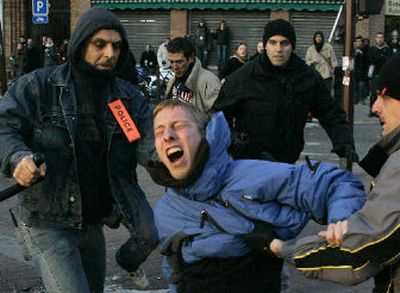French are paying a high price for job security

French students closed their universities and took to the streets last week for a grand cause most Americans would consider goofy: two years of almost absolute job security for anyone under age 26. Any Shadle Park High School junior working the counter at Burger King would take that deal in less time than it takes to ask if you want fries with that.
In fact, almost anyone of any age would consider a guarantee of 24 monthly paychecks manna.
For many Americans, job security, even for two years, is an oxymoron. But we’ve come to live with that.
Not so the French. That nation’s university students, supported by labor, oppose a contract premiere embauche, or first job contract, proposed by Premier Dominique de Villepin. The reform would allow an employer to fire a young worker with less than two years experience without cause, although not without some compensation. The possibility of summary layoff is anathema in a country — on a continent — where job security is a given. Labor groups fear the age threshold will gradually creep higher and engulf more of France’s work force.
Monday, some unions were threatening to call for a one-day general strike to demonstrate the vehemence of their opposition.
Of course, the French frequently take to the streets; bloodily so in the case of the Revolution in 1789 and the Paris Commune of 1871. The demonstrations were more civil in 1968, when World War II hero Charles de Gaulle was nearly bounced as president. He resigned less than a year later.
As Eastern Washington University Professor Grant Forsyth puts it, “One thing about the French, they’re very good at showing their displeasure.”
Forsyth spent three years in the Czech Republic observing first-hand European attitudes toward employment. After the traumatic experiences of depression in the 1930s and the destruction of World War II, he says, Europeans treasure job security above all else. In return, they have been willing to tolerate relatively high unemployment, coupled with high tax rates and a comprehensive social safety net.
That’s not much of an environment for investment capital. Nor is it much of a response to new global competition. But the French have not yet marshaled the political will to change, and France’s university students seem to be in the vanguard of reaction. Yet most will graduate at age 25, and therefore have less to fear from de Villepin’s plan than those younger, less educated and less fortunate. For all workers less than 26 years of age, the unemployment rate is an astounding 23 percent. Only half of all minority and immigrant youths have jobs, which helped trigger last fall’s outbreaks of violence.
The overall jobless rate in France as of January was 9.6 percent, exactly twice the rate for the United States.
De Villepin hopes to encourage more hiring by alleviating employer fears that once an untested employee comes through the door, getting him or her out that door may be impossible for two years.
Forsyth says Americans, young and old, accept the possibility of unforeseen layoffs as a tradeoff for an overall unemployment rate less than half that in many European countries. They also expect more opportunities to climb the corporate ladder.
At the Washington Employment Security Department, economist Jeff Zahir says many in trades like construction plan to be laid off and rehired as jobs become available, then disappear. Gains in productivity, a key measure of economic vitality, depend in part on this cycle, he says.
Although technology drives increases in labor productivity long-term, short-term gains are measured by how many workers can be laid off with no reduction in output.
Zahir likens the tension in France to what happened in Japan when companies in the 1990s took the unheard of step of laying off employees. Change will come. There’s no place in a global economy for the expectation of a lifetime job, he says. “I think it’s wrong.”
Right now, the least secure job in France may be that of de Villepin, who has been president since last May. He’s trying to defuse the crisis, but he might wish he could get one of those two-year contracts.